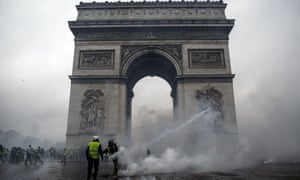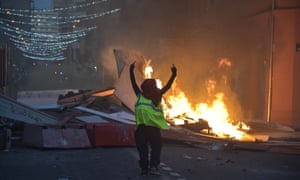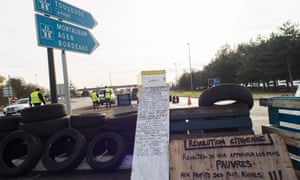By Angelique Chrisafis
Grassroots citizens’ revolt against fuel tax rises has morphed into president’s biggest crisis.
On the grass verge of a village roundabout north of Toulouse, Céline stood at a barricade built from pallets of wood and old tyres, a bonfire burning behind her. French flags were flying alongside signs calling for Emmanuel Macron’s resignation.
“I’m prepared to spend Christmas protesting at this roundabout with my children – we won’t back down and we’ve got nothing to lose,” said the 41-year-old, who voted for Macron in last year’s presidential election. “He gave good speeches and I really believed his promises that he would change France. But not any more.”
Céline, a classroom assistant for children with special needs, earns €800 (£710) a month. She cannot afford rent so lives with her four children in a relative’s house in the suburbs of Toulouse, in the south-west of France.
“Macron’s first move in office was to slash the wealth tax for the mega-rich while cutting money from poor people’s housing benefits,” she said. “That is a serious injustice. The country is rising up and he’s staying silent, he’s hiding in an ivory tower, that’s what disturbs me, he’s not taking responsibility.”
At the roundabout barricade in Lespinasse, 20 people from surrounding villages – builders, nurses, workers in the local aviation industry – protested near a crucial fuel depot, wearing the yellow high-visibility vests that define France’s gilets jaunes movement. Passing trucks and cars beeped in support. Drivers leaned out of their windows and shouted “Don’t give up!”This grassroots citizens’ protest, which began as a spontaneous revolt against fuel tax rises last month, has morphed into an anti-government and anti-Macron movement and is now the young centrist president’s biggest crisis. The demonstrators say that Macron is an arrogant would-be monarch. He presents himself abroad, they say, as a progressive hero who can hold back the tide of nationalism, but at home he symbolises a distant political elite, stoking distrust and pushing people towards populism.
[Macron] misread these protests … he thought he was the saviour of France
Robert, carpenter
“I always feared that there was an element of dictator in the way Macron did things,” said Robert, 64, a leftwing Toulouse carpenter and cabinet maker. “He’s well-presented and he speaks nicely – but he misread these protests because he thought he was the saviour of France. He wasn’t listening, he forgot the human factor.”
Last Saturday saw the worst street unrest in central Paris in decades, as fringe elements of the otherwise peaceful protesters fought running battles with riot police and set cars alight. Tourist attractions and museums in Paris will be closed on Saturday, and the government has warned that thousands of rioters might come to the capital to “smash” or even “kill”. Yet gilets jaunes across France are determined to march in towns and cities this weekend anyway.
Crucially, the government fears violence not just in Paris but outside it. Local government offices were torched in the small central town of Puy-en-Velay last weekend. In Toulouse, there were running battles with riot police with several injured. Motorway toll-booths have been burned down and vandalised in southern France, and when high-school students staged demonstrations this week against university and school reforms, riot police fired teargas at several demonstrations. The entrance hall of a high school in Blagnac outside Toulouse was burned to the ground.
One transport worker in his 20s who took part in a street march in the small country town of Montauban in the south-west said he was shocked by the teargas. “Things will kick off for sure again this weekend, there could be violence anywhere in France,” he said.
The roundabouts and motorway toll-booths that gilets jaunes continue to blockade are often near small towns and villages that do not normally make the news. Main cities are often far away, meaning residents cannot work or take children to school without a car – hence their fury at fuel tax rises.
Demonstrators of all backgrounds and political views seem united on one point – a personal disgust with Macron, whose “arrogance” they cite from televised examples, including the time he told an unemployed person to just “cross the road” to find a job, or when he wagged a finger to tell pensioners they shouldn’t complain. Then there is the outrage over refurbishments to the Élysée Palace and the construction of a holiday pool in the presidential summer retreat. One poll this week showed Macron’s approval ratings down to 18%.
“This is now about so much more than fuel tax,” she said. “We seem to live in a world gone mad where the rich pay next to nothing and the poor are constantly taxed. We’ve had enough of the elite.”Isabelle, 41, a single mother, had never taken part in a protest movement before. She works at a sandwich stand at Toulouse airport for the minimum wage – less than €1,200 a month – and her daily shifts begin at 3am. She was among many who had deliberately spoiled her ballot paper in last year’s presidential election final round, unwilling to choose between Macron or the far-right Marine Le Pen.
The gilets jaunes movement is unlike any other seen in postwar France because it sprang up online without a leader, trade union or party behind it. Along the barricades there is a broad mix of people, some apolitical, some on the left who feared nationalism, some who had voted for the nationalist Le Pen, some environmentalists. Many were against the European Union, feeling it enshrined rampant capitalism.
One 24-year-old philosophy student said: “This feels like a historic moment in France. I’d liken it to the Arab spring – a kind of revolution that started online.”
Although the demonstrators have complained that poor people bear the brunt of France’s high taxation, they are still attached to public services. A banner on a building in Lespinasse read: “We want a train station.” Across France, rural areas have complained about depleted public services. There was a sense that public money was being misspent and used primarily to maintain the plush lifestyle of a political elite.
“Hospitals are understaffed and under financed,” said a 39-year-old nurse from a Toulouse hospital. “But what has united everyone is Macron’s arrogance. He has made the tension worse, like a little king pitching himself against a whole nation. Macron has held us to ransom saying he was the only one who could hold back nationalism and Le Pen, but he has no credibility at all in France.”
Fabien Mauret, a self-employed builder, was cooking sausages on a barbecue for the protesters. “I think we’ve got to the point of no return,” he said. “Before, there were the rich, the middle and the poor. Now it’s the very rich and the poor, nothing in between.”
He used to vote Socialist but now he votes Le Pen. “These roundabout protests are jolly. But the government knows that demonstrations could get ugly. I don’t think that’s a good thing, but it’s the reality.”
Raymond Stocco, 64, who used to work in aircraft maintenance, suggested the mega-rich should be forced to pay back the tax breaks they had enjoyed over the past four years. “Macron’s big mistake was treating people in France as if we were stupid,” he said.
In this corner of rural and suburban south-west France, protesters planned to expand to blockading hypermarkets as a way to force people back to small local shops.
Many said the movement will last, in part because of the community feeling it had engendered. Alexandre, a retired trucker who lived in a caravan, was spending his 63rd birthday at the barricade. “I’m less lonely when I come here to talk politics to everyone,” he said.





No comments:
Post a Comment